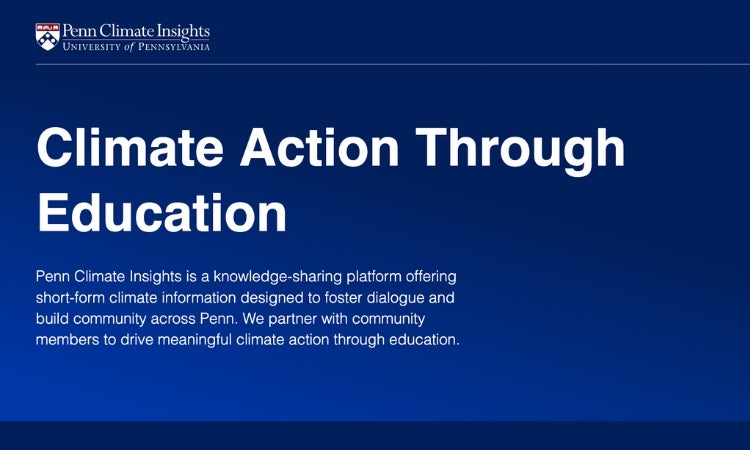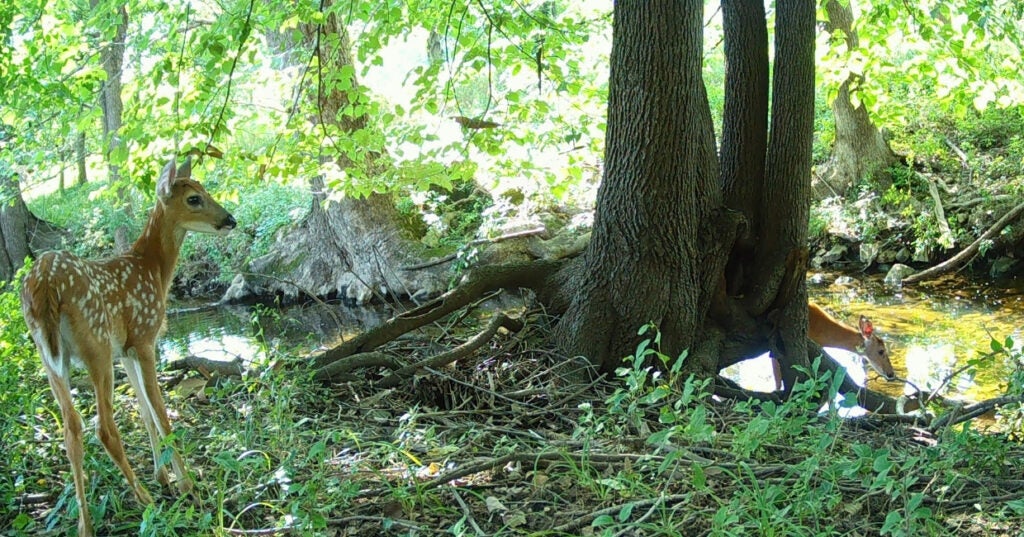Introducing Penn Climate Insights, a Tool for Climate Education, Action, and Community Building

Penn Climate Insights, a new website platform for sharing and acquiring trusted information about climate knowledge and related research, is now accessible to the entire University of Pennsylvania community.
Initiated and led by Andrew Hoffman, Dean of Penn Vet, the platform was launched after a year of research and development, including surveys and focus groups from the Penn community conducted by Sam Nguyen, Penn Vet’s Climate Innovation Coordinator. Climate Insights is a new tool designed to help educators access and integrate rigorous climate information contributed from Penn faculty and community experts into their teaching and learning experiences. It will also be a resource for the rest of the Penn community to increase climate engagement, literacy, and – its founders hope – take action.
“Education is a form of empowering climate action,” Hoffman said. “That’s really what it says on our website: Climate action through education.”
Anyone with an active PennKey can access the site to explore the Insights Library of articles, recorded lectures, and slides; collections of Insights are also available. Those with expertise, or co-authoring with experts, can also offer submissions. The Insights – concise, accurate information modules about climate change impacts, adaptation, mitigation, and resilience – have intentionally been kept brief to facilitate easy use. Text articles are no longer than about 500 words. The limit on audio and video files is about 15 minutes. There will also be toolkits with materials to support educators in incorporating climate Insights into their coursework.
On October 13, during Climate Week, Penn Climate Insights will hold a “ribbon-cutting” to preview and celebrate the platform’s official launch. At the time of launch, the website is open to contributions, with the goal of 500 Insights by the end of FY26. The team has begun inviting experts to contribute to the website, hoping for a strong community response.
Here, Dean Hoffman and early website supporters Katie Unger Baillie, director of Penn’s Environmental Innovations Initiative (EII), and Sarah Kagan, professor of Gerontological Nursing, both who have already contributed Insights, share their outlook for the new platform and why they believe it’s needed.
Give educators the tools to enable change
Even before he thought about building a website, Dean Hoffman believed more education was key to climate agency and action. “My interest and the interest of our community in building education about climate and sustainability was not really backed by the availability of trusted knowledge, educational platforms, or toolkits for educators,” exploring climate education, said Hoffman.
Research has shown that educators face significant barriers to environmental information due to siloed curricula, limited resources, and misinformation.
As research for the website, the Climate Insight founders administered a survey about climate and sustainability to faculty, staff, and students across Penn’s 12 schools. Ninety percent of its respondents said they seek out climate information. However, over a fifth reported a lack of accessible resources, and about as many said they lacked confidence in their climate knowledge.
The vast majority said they would use a ‘knowledge-sharing website created by the Penn community that offers searchable, peer-reviewed information on climate.’
That website is now Penn Climate Insights.

The platform still has growing to do, and its first year will be a pilot year.
“We hope that Penn Climate Insights will serve as the premier information-sharing and education platform for climate and sustainability for the Penn community,” Hoffman said.
Because of its open accessibility, Climate Insights can “serve as a firewall that insulates us from mis- and dis-information on critical topics,” Hoffman noted.
In time, the website’s founders say it is possible Penn Climate Insights could grow even further and partner with other universities.
But for now, the focus is on Penn and expanding climate education and importantly, building a highly visible and accessible climate-focused community on this campus.
“We want people to come to Penn and recognize that there is a vital climate community, and we want it to be highly visible,” Hoffman said. “We want Penn to be a destination for students to come and say, ‘I want to go here because Penn has a great climate program and accessible community.’”
Teaching climate across the disciplines
As director of the Environmental Innovations Initiative, the role of Katie Unger Baillie and her team is to help foster collaboration in education, research, and programs across disciplines on environmental issues. She sees Penn Climate Insights as a useful information tool – easily searched, indexed in a straightforward manner – that has the power to broaden what is taught across the Penn community.
“It is absolutely in alignment and greatly supportive of the EII mission, which is to enlist interdisciplinary expertise from all around the University of Pennsylvania in contributing to solutions to the climate crisis and other environmental challenges,” Baillie said.
By making engaging, up-to-date information easily accessible, Baillie said Climate Insights may engage faculty interested in climate but who do not feel they have the background knowledge or resources to include it in their curriculum.
“They want to be teaching about climate change and the environment, but they may not always feel well-equipped to do so,” she said.
Network-building to fight a health and climate crisis
Sarah Kagan, professor of Gerontological Nursing, said Penn Climate Insights has the potential to be a network builder, as well as a rich source of climate- and health-related information. She is hoping that all sorts of people step up to that opportunity – that teaching colleagues, and others in the Penn community involved in the health field, contribute their research, teaching, or practice experience to Penn Climate Insights.
“That’s because this crisis is a proverbial all-hands-on-deck situation,” Kagan said. “It is the most significant crisis that anyone alive today will ever experience. It needs everyone’s contributions as we come together in a true sense of community for the sake of our planet and all who live on her. We all need to join together to share our science, our practice, and our vision for a healthier future.”
Related News

A New Penn Vet Study is Finding Where the Wild Things Are: Right Here in Philly!
A new project, the Accessing Urban Nature Initiative (AUNI), has started capturing images of seldom seen but decidedly special city dwellers like these – and many others – with the…

Penn Vet’s Next Gen Biomedical Scientists Present Their Research at the Annual Veterinary Scholars Symposium
Two dozen budding Penn Vet scientists presented a rich array of ambitious biomedical research projects at the annual Veterinary Scholars Symposium held last month in Spokane, Washington.

A New Penn Vet Clinic Brings Support and Hope for Dogs with Retinal Disease
Zoey the cockapoo greeted life with tail-wagging joy. A mass of tawny curls, she loved everyone, and they loved her back.
About Penn Vet
Ranked among the top ten veterinary schools worldwide, the University of Pennsylvania School of Veterinary Medicine (Penn Vet) is a global leader in veterinary education, research, and clinical care. Founded in 1884, Penn Vet is the first veterinary school developed in association with a medical school. The school is a proud member of the One Health initiative, linking human, animal, and environmental health.
Penn Vet serves a diverse population of animals at its two campuses, which include extensive diagnostic and research laboratories. Ryan Hospital in Philadelphia provides care for dogs, cats, and other domestic/companion animals, handling more than 34,600 patient visits a year. New Bolton Center, Penn Vet’s large-animal hospital on nearly 700 acres in rural Kennett Square, PA, cares for horses and livestock/farm animals. The hospital handles more than 6,200 patient visits a year, while our Field Services have gone out on more than 5,500 farm service calls, treating some 18,700 patients at local farms. In addition, New Bolton Center’s campus includes a swine center, working dairy, and poultry unit that provide valuable research for the agriculture industry.
